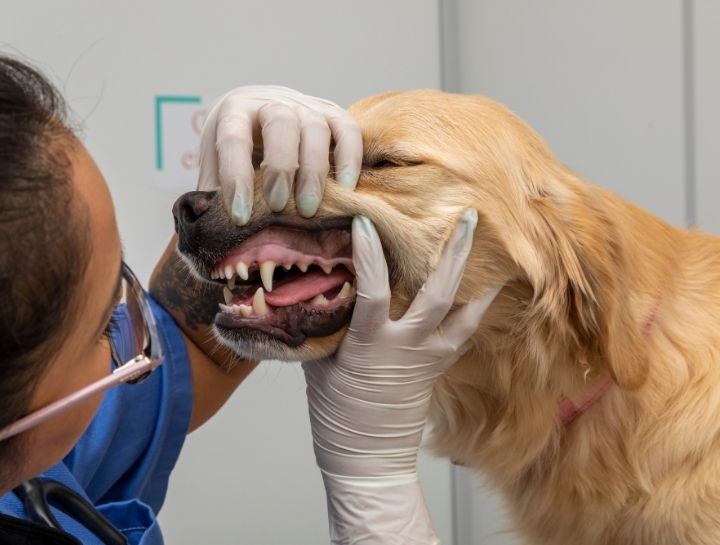Dentistry
Preventive dental care for pets
Love conquers all things except poverty and a toothache. – Mae West
Have you ever had a toothache? It hurts! Keeping your pet’s teeth clean and healthy is imperative to their health. They deserve clean, pain-free teeth. The American Dental Association recommends humans have their teeth checked every six months, which is equivalent to every three years in a pet.
Dental disease is one of the most overlooked diseases in pets, even though it is very prevalent and dangerous. If left untreated, the disease can travel through the bloodstream. This causes many serious problems, including heart, liver, and kidney disease.
The worst part of dental disease is its prevalence. It is thought that 80% of dogs and 70% of cats more than three years old are affected by the disease. The number is astonishing, considering how many pets are well taken care of!
The best way to prevent dental disease is to brush your pet’s teeth.
Good dental care also requires routine examinations by a veterinarian.
Veterinarians can catch dental disease early. Your pet’s teeth should be checked twice a year by a veterinarian for early signs of dental disease to ensure your pet is healthy.
Have your pet’s teeth checked sooner if you observe any of the following problems:
- Bad breath
- Broken or loose teeth
- Extra teeth or retained baby teeth
- Teeth that are discolored or covered in tartar
- Abnormal chewing, drooling, or dropping food from the mouth
- Reduced appetite or refusal to eat
- Pain in or around the mouth
- Bleeding from the mouth
- Swelling in the areas surrounding the mouth
Some pets become irritable when they have dental problems, and any changes in your pet’s behavior should prompt a visit to your veterinarian. Always be careful when evaluating your pet’s mouth, because an animal in pain may bite.
Take a quick look at this homemade video on checking your pet’s teeth:
One more thing…
To help prevent tooth fracture, only safe items should be given to your pet. And the following items should be avoided:
- Real bones
- Nylon bones
- Cow hooves
- Ice cubes
- Sticks
- Cages (if your pet chews on them)
- Rocks
- Other hard treats or toys
How does a dental cleaning work?
Step 1: Exam and lab work
The veterinarians will review what they have found during the dental exam. They may discuss medical history, buildup of plague, diseased gums, possible tooth extractions, masses, retained baby teeth, or general preventive cleaning.
When the lab work is back and reviewed, the veterinarians will call you if they find a problem that may prevent future dental work.
A written estimate will be given on what the dental procedure will cost. It will be approximate as we will not know exactly what needs to be done until the procedure is complete.
This is a good time to talk about postoperative medications for pain and infection.
Step 2: Schedule a professional dental cleaning and/or procedure
The dental procedure must be scheduled within 90 days of lab work and exam to ensure no new disease or concerns have occurred.
Dental procedures are done Monday through Friday at 7 am.

